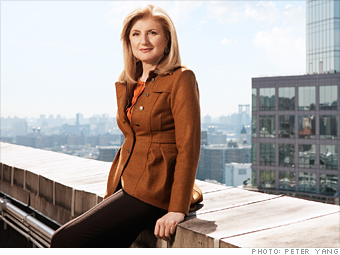Search News

In 2005, two years after a failed run for Governor of California (she lost to Arnold Schwarzenegger), Arianna Huffington sought a new challenge. Huffington, whose wit, intelligence and charisma had made her a sought-after pundit on political talk shows, realized the civic "conversation was moving online. People had relevant things to say... and they weren't alone in saying them," she tells Fortune.
That year, she and Kenneth Lerer, an angel investor, former AOL Time Warner executive and founding partner of media firm Robinson, Lerer, and Montgomery, launched The Huffington Post. She says: "We wanted to open up the conversation and elevate blogging."
Starting with only six employees, the website aggregated other sites' content -- much to the chagrin of media traditionalists -- and also produced its own. The Huffington Post has grown immensely since; in early January, the site attracted 28 million unique visitors. AOL CEO Tim Armstrong took notice and, in an attempt to redirect and bolster his company's struggling brand, purchased The Huffington Post for $315 million.
Huffington famously signed the deal during halftime of the 2011 Superbowl, converting her once small, privately owned company into a large, publically traded one. She also became the editor-and-chief and president of the newly created Huffington Post Media Group, putting her in charge of all AOL owned media outlets.
Going corporate has increased Huffington's media clout -- so much so that Bluewater Comics, an independent publisher of graphic novels and comic books, features Huffington's story in its Female Force series. "It's flattering," Huffington says. "It's about not giving up... a message for young women that life is never linear. You should never get discouraged."
Her two daughters, Christina and Isabella, are very sweet about all the power talk, she says. "I've worked all their lives. It's always been a juggling act. But the most important thing is them." Huffington's own mother was her greatest mentor. "She was the central figure in terms of everything I tried to do," says Huffington.
In 2000, when her mother died, Huffington wrote, "There was a magnificence in the way she approached everything in her life. Especially her role as mother. She brought me up to believe that there was nothing I should be afraid to try while at the same time making it clear that she would love me not one iota less if I failed."
Huffington's mother may have taught her to be fearless, but that doesn't mean the media maven is a stranger to failure. She's written and spoken about her many defeats -- including the time her first book was rejected by more than two-dozen publishers. "Failure is a stepping stone to success," Huffington emphasizes.
This type of unshakable optimism keeps the media executive afloat amidst rumors about AOL's uncertain future. "This is the Golden Age of quality and growth for The Huffington Post. The rumors circulating don't affect media," she claims. With a large budget and lots of runway, Huffington is less focused on the future of AOL and more focused on seeing through her goals of expanding The Huffington Post locally and globally. She's launched branches in Canada and the UK, created several new pages such as "Women" and "Black Voices," and continues to work toward future partnerships with various countries. (When we met she was about to leave for Brazil.)
The Huffington Post has been "blessed with everything that has happened so far," says Huffington. AOL provided HuffPost with the assistance it needed to see out its vision. "It was like in a fairy tale. You know, when the helpful animals come along."
Huffington may be as charming as the princess in one of those fairy tales, but she is not a damsel in distress. If her animal friends fall ill, it is doubtful she will stick around. Yet, no matter the ending, it's a safe bet that Arianna Huffington will survive.
